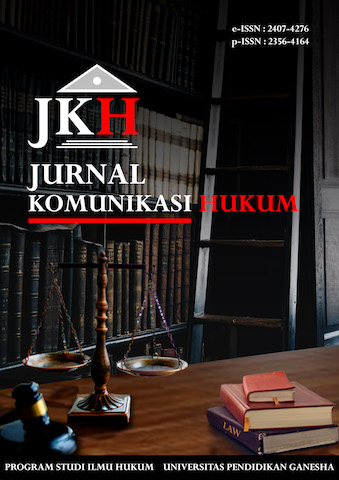PENGEMBANGAN DESA WISATA BERBASIS KEARIFAN LOKAL SEBAGAI STRATEGI PENGENTASAN KEMISKINAN DI KABUPATEN KLUNGKUNG
DOI:
https://doi.org/10.23887/jkh.v9i1.55346Abstract
This study aims to find out, understand and analyze (1) the form of tourism recovery affected by the pandemic through the development of tourism villages based on local wisdom; (2) recovery of tourism affected by the pandemic through the development of tourism villages based on local wisdom in its application as a poverty alleviation strategy in Klungkung Regency; and (3) the implications of implementing the recovery of tourism affected by the pandemic through the development of tourism villages based on local wisdom as a poverty alleviation strategy in Klungkung Regency. This type of research is field research, using an approach to empowering the poor through an approach and public awareness is needed so that they can use and have access to control in the development of tourist villages. Secondary data is data that is used as supporting material for research preparation. Data collection techniques in this study include literature study, observation, and interviews. The data analysis of this research includes quantitative descriptive analysis and qualitative descriptive analysis. The results of this study indicate that there is no maximum development of tourism villages based on local wisdom as an effort to alleviate poverty to overcome the powerlessness of the poor caused by limited access, lack of knowledge and skills, trapped in poverty (poverty trap) and community powerlessness. Therefore, further development is needed to realizing community independence in tourism villages in Klungkung Regency, especially increasing the involvement and active participation of the community in various income and welfare activities as well as the utilization of tourist villages by the community and local government. The strategy of developing a tourism village based on local wisdom in Klungkung Regency needs to pay attention to things, including the marketing of tourism village packages that show the selling value of the village, sustainable management of tourist villages and preserving the tourism village itself as part of the potential of the tourist village.
Downloads
Published
How to Cite
Issue
Section
License
Authors who publish with this journal agree to the following terms:- Authors retain copyright and grant the journal right of first publication with the work simultaneously licensed under a Creative Commons Attribution License that allows others to share the work with an acknowledgement of the work's authorship and initial publication in this journal.
- Authors are able to enter into separate, additional contractual arrangements for the non-exclusive distribution of the journal's published version of the work (e.g., post it to an institutional repository or publish it in a book), with an acknowledgement of its initial publication in this journal.
- Authors are permitted and encouraged to post their work online (e.g., in institutional repositories or on their website) prior to and during the submission process, as it can lead to productive exchanges, as well as earlier and greater citation of published work (See The Effect of Open Access).
Authors who publish with this journal agree to the following terms:
- Authors retain copyright and grant the journal right of first publication, with the work [SPECIFY PERIOD OF TIME] after publication simultaneously licensed under aCreative Commons Attribution License that allows others to share the work with an acknowledgement of the work's authorship and initial publication in this journal.
- Authors are able to enter into separate, additional contractual arrangements for the non-exclusive distribution of the journal's published version of the work (e.g., post it to an institutional repository or publish it in a book), with an acknowledgement of its initial publication in this journal.
- Authors are permitted and encouraged to post their work online (e.g., in institutional repositories or on their website) prior to and during the submission process, as it can lead to productive exchanges, as well as earlier and greater citation of published work (See The Effect of Open Access).












